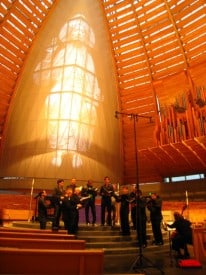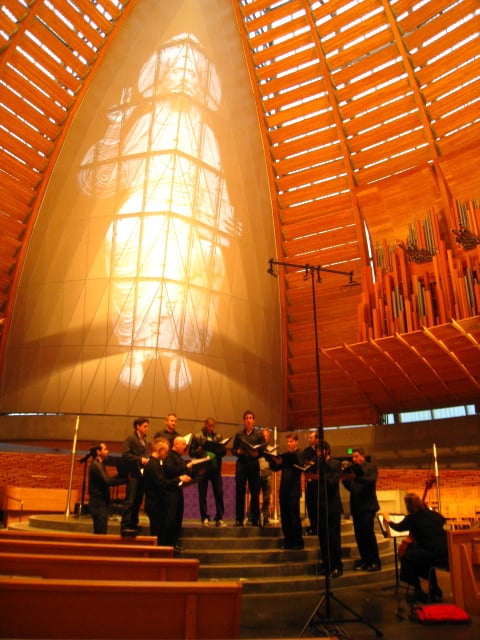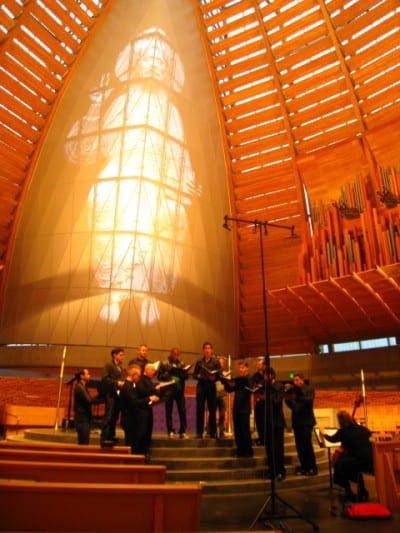The Boy Whose Father Was God
- March 26 ~ Oakland, Cathedral of Christ the Light<br/>
- March 27 ~ Sacramento, St. Francis Church<br/>
- March 31 ~ San Jose, St. Joseph Cathedral Basilica<br/>
- April 1 ~ San Francisco, Grace Cathedral

Singing at the St. Joseph’s Cathedral Basilica, Chanticleer presented The Boy Whose Father Was God. Unbroken by an intermission, the work is an integral whole that needs to be heard in its entirety. Like Handel’s Messiah, it serves as a meditation, rather than a mass, tracing the life of Christ from birth to post-crucifixion events.
The piece opens quietly, with members of Chanticleer entering from the rear of the basilica singing the wordless Lullaby. This was immediately followed by Let Me In, a commissioned work by Roxanna Panufnik in which the Aramaic Kaddish is sung against a text from the Infancy Gospel of Thomas.
Despite the ancient texts, this piece has a modern feel. Mixing Jewish texts with Christian ones never sits easily with me, smacking too much of right-wing evangelical fantasies on one hand, and Jews for Jesus on the other. However, in this instance, the combination works. Kaddish has a drone-like feel, the perfect foil for the Infancy Gospel, whose vocal score emphasized diminished sevenths, the dissonance speaking to the anguished mother. In swapping out the usual story of dazzling the elders at the temple in favor of a non-canonical text about the child Christ, Chanticleer adds unexpected novelty, making it a richer experience for the audience. The intense vocal dissonance continue throughout the piece, until the child Christ revives the dead baby, at which point all the voices come together in a final harmonious cadence.
Dissonant voices continue throughout The Book of Matthew, authored by Mason Bates. The lines “Come follow me,” echo across the group as smoothly as ripples in a pond.
The most gripping moments of the evening were during Forces IV – Collage, a piece authored by Peter Michaelides. An ambitious eight-part work, it begins with a brief narration: “Collage – the particles of mass, the fragments of thoughts and awareness; the last few moments of Christ’s life and the first moments following the cessation of life.” Various sections of the work spoke to the labored breathing of the dying Christ, hissing snake sounds, the rabble of the crowd and the lament of Mary, sung by Gregory Peebles with a vibrato so intense it bordered on ululation. The piece ends with a communion hymn sung in Greek which set one group of droning voices over another set of droning voices.
Perfectly scripted so that the crucifixion was the emotional high point of the evening, it seemed impossible that anything could possible follow Forces IV – Collage. However, The Tropation of Kassiani had a light feel as Chanticleer broke into two groups of six, almost as if the intensity of the previous piece necessitated some kind of separation. The evening ended with Grace to You, a work by Jan Gilbert.
The audience applause – forbidden until the very end – had a unique quality of its own, as it came in waves, until everyone realized that an encore would not be forthcoming. As disappointing as this was, I cannot imagine what Chanticleer could have sung that would have maintained the integrity of this single meditation. One hopes this event will be included in the Chanticleer Live in Concert Series, particularly as most of these works have not been recorded before.



